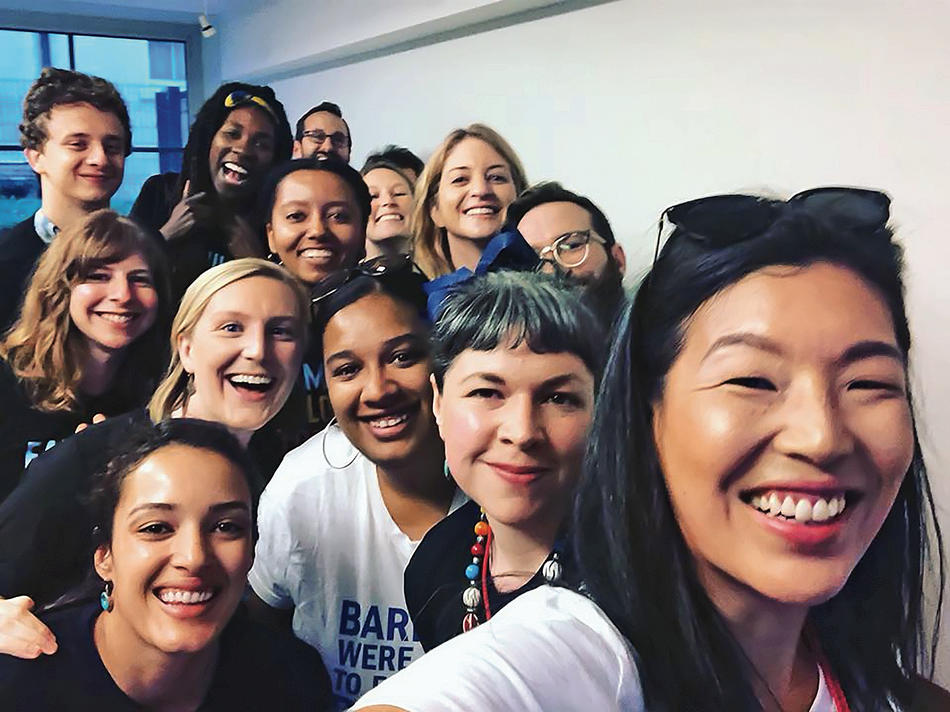It’s a Sunday afternoon in June, and in McAllen, Texas, a crowd of protesters has gathered outside the Ursula Border Patrol processing center. The sun is strong, and there isn’t a shade tree in sight, but the group is undeterred, waving signs and chanting, decrying the Trump administration’s family-separation policy.
At the front of the pack is Ai-jen Poo ’96CC, an activist and organizer who has spent over twenty years championing the rights and welfare of the US’s 2.5 million domestic workers. As the executive director of the National Domestic Workers Alliance (NDWA) — which cosponsored the protest in McAllen, as well as others across the country — it is her job to follow the issues and policies that affect the lives of workers, including nannies, housekeepers, and elder-care providers. Her constituents are overwhelmingly women and people of color, and many of them are immigrants, likely to be affected by border-control measures.
Throughout her career, Poo has argued that domestic workers, who are unprotected by most federal and state labor laws, face disproportionate discrimination in the workplace. “The people that care for our children and parents and clean our homes are such an intimate part of our lives,” she says. “So why don’t we do more to protect and empower them?”
The daughter of Taiwanese immigrants, Poo originally studied ceramic arts at Washington University in St. Louis before she transferred to Columbia to get a bachelor’s degree in women’s studies. In the spring of 1996, she helped organize a student-led coalition to establish the Center for the Study of Ethnicity and Race at Columbia. The campaign was successful, and the experience helped shape Poo’s career path. “I saw activism as my anchor,” she says.
After graduating, Poo worked as an organizer in New York’s Asian immigrant communities and then helped to found Domestic Workers United (DWU) — a group of New York–based nannies, housekeepers, and elder-caregivers. In 2007, under Poo’s leadership, DWU convened a meeting of thirty similar organizations from around the country, which led to the formation of NDWA. DWU also achieved a major legislative victory in New York in 2010 when it pushed through the statewide Domestic Workers’ Bill of Rights — the first law in the United States to guarantee domestic laborers basic rights like overtime pay, paid leave, and legal protection against harassment.
“It was a real breakthrough moment, in terms of both tangible protections and ensuring that this kind of work was recognized by the state as deserving of respect and dignity,” says Poo, who estimates that she took over fifty trips to Albany to lobby for the legislation. After the bill passed, Poo left DWU to take the helm of the national organization, NDWA.
Poo’s work has been recognized with a number of awards, including a MacArthur “genius grant” in 2014, but in January 2018, she received an unusual honor: an invitation to be Meryl Streep’s date to the Golden Globes. Poo was one of several activists there in support of the Time’s Up movement against sexual harassment.
Poo says that seeing activism — particularly on behalf of women — get attention in popular culture felt like a historic moment, and she hopes to see that trend continue this fall. There are a record number of women on the ballot for the midterm elections, and for the first time, NDWA has endorsed a political candidate: Stacey Abrams, who is running for governor in Georgia. If elected, Abrams will be America’s first Black, female governor, and she has pledged support for Georgia’s large population of domestic workers. Poo says that candidates like Abrams give her hope for the future.
“Women are showing up for each other,” Poo says. “We have an unprecedented opportunity to create real, lasting change.”



